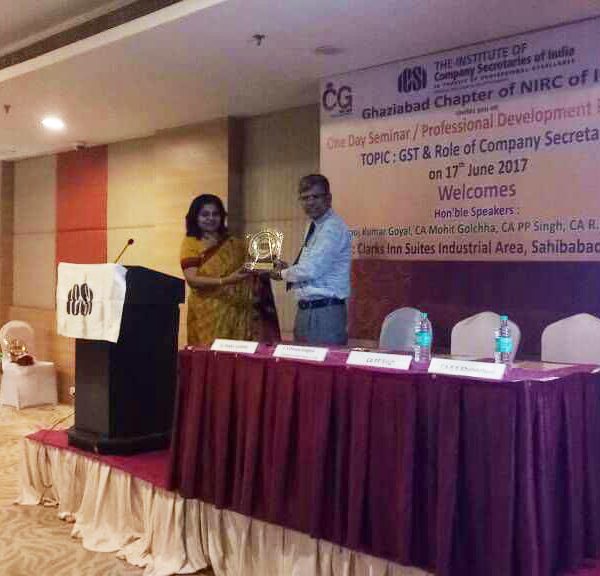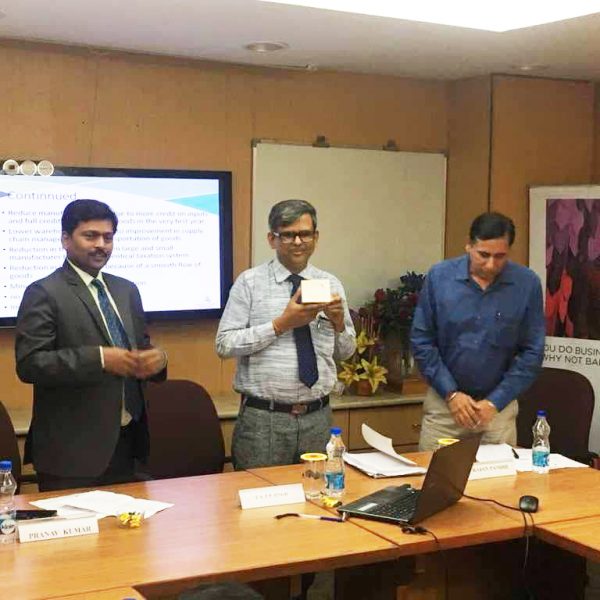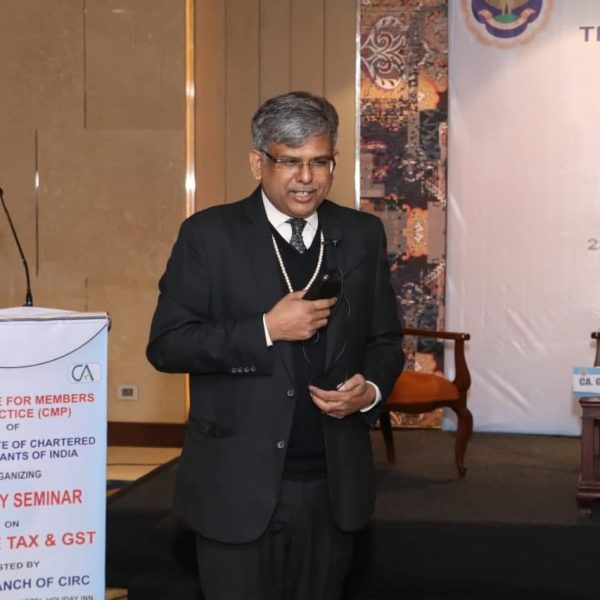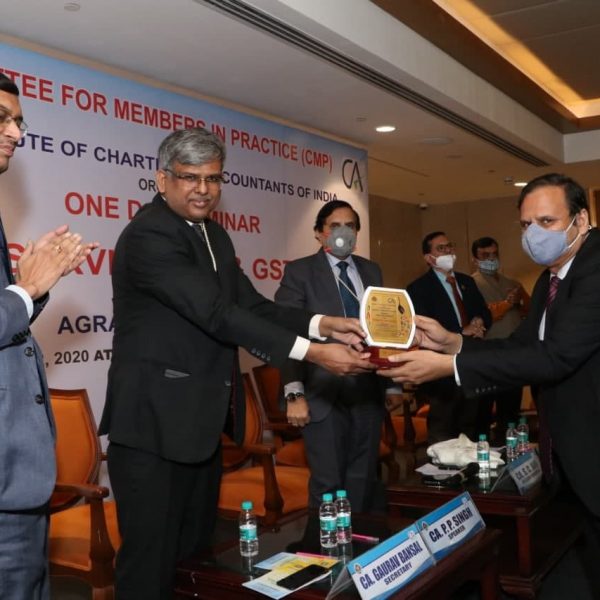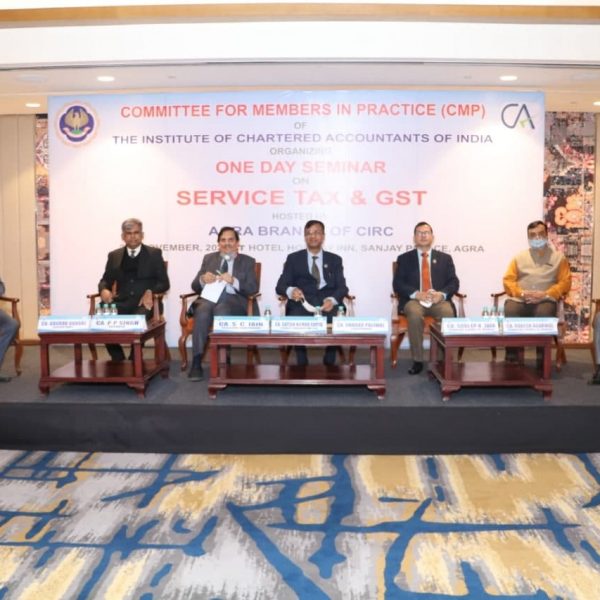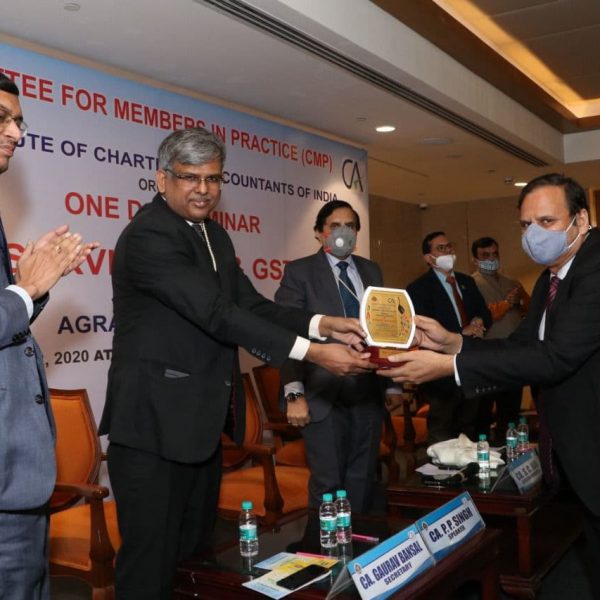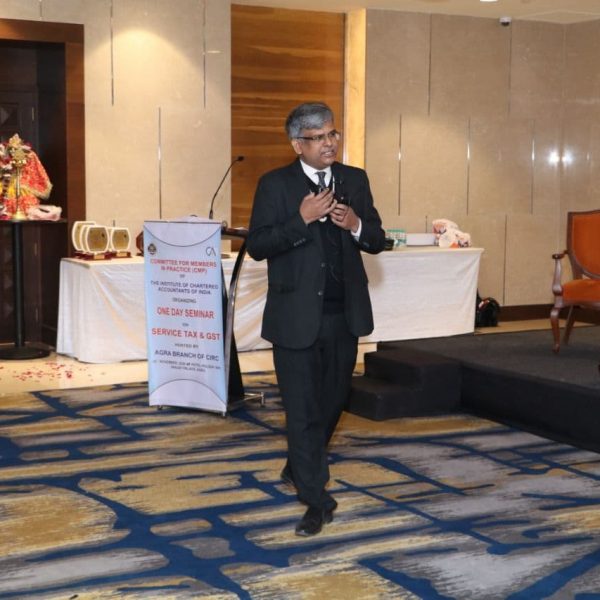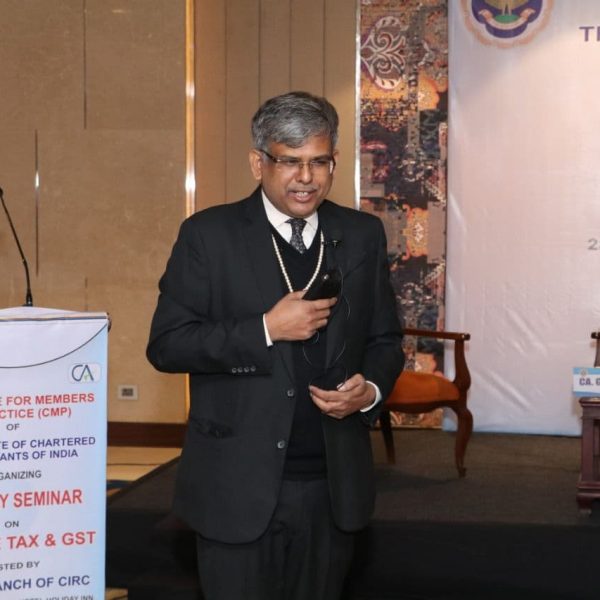Provisions regarding claiming of Input Tax Credit, cases in which input tax credit is not available known as block credit.
Eligibility and conditions for taking input tax credit
Eligibility:
- (1) Every registered person shall, subject to such conditions and restrictions as may be prescribed and in the manner specified in section 49, be entitled to take credit of input tax charged on any supply of goods or services or both to him which are used or intended to be used in the course or furtherance of his business and the said amount shall be credited to the electronic credit ledger of such person.
comments: only registered Persons are eligible to avail of ITC, what would happen if registration cancelled suo moto since 01-07-2017 of a taxable person in the year 2023, he is liable to pay GST output tax but no ITC claim since unregistered at present. in my view registration is to be checked at the time of availing credit and not at the time of issuing SCN or assessment order because, at the time of availing credit, such a person was registered and fulfilling all the conditions so demand could not be created by cancelling registration retrospectively.
conditions :
(2) Notwithstanding anything contained in this section, no registered person shall be entitled to the credit of any input tax in respect of any supply of goods or services or both to him unless,—
- (a) he is in possession of a tax invoice or debit note issued by a supplier registered under this Act, or such other tax-paying documents as may be prescribed;
(bb) the details of the invoice or debit note referred to in clause (a) has been furnished by the supplier in the statement of outward supplies and such details have been communicated to the recipient of such invoice or debit note in the manner specified under section 37; reported by the supplier in GSTR-1/IFF and reflected in GSTR-2B. this clause is a new one, Inserted by the Finance Act, 2021, w.e.f. 1-1-2022.
(c) he has received the goods or services or both.
- Comments: Required to check E-way bill status, goods in transit reported in balance sheet/accounts.
The legal fiction of Deemed receiving of goods or services:
[Explanation.—For the purposes of this clause, it shall be deemed that the registered person has received the goods or, as the case may be, services—
(i) where the goods are delivered by the supplier to a recipient or any other person on the direction of such registered person, whether acting as an agent or otherwise, before or during the movement of goods, either by way of transfer of documents of title to goods or otherwise; a bill to ship to model for supply of goods
(ii) where the services are provided by the supplier to any person on the direction of and on account of such registered person.] bill to, ship to model for supply of services.
(ba) the details of input tax credit in respect of the said supply communicated to such registered person under section 38 has not been restricted; i.e. in GSTR-2B unrestricted ITC.
(c) subject to the provisions of section 41, the tax charged in respect of such supply has been actually paid to the Government, either in cash or through utilization of input tax credit admissible in respect of the said supply; and
(d) he has furnished the return under section 39. GSTR-3B. a person claiming ITC must have to furnish a return for claiming ITC.
comments: when all these conditions are to be checked at the time of availing credit or at the time of SCN/assessments, in my view these conditions are for availing credit so these conditions are to be checked at the time of availing credit and not at the time of SCN/assessments, later disability due to any reason such as retrosp[ective cancellation of registration of supplier of inward supply does not disable or restrict ITC.
goods received in installments or lots, ITC entitlement on receiving the last installments:
Provided that where the goods against an invoice are received in lots or installments, the registered person shall be entitled to take credit upon receipt of the last lot or installment:
Reversal of ITC on failure to pay the value of consideration along with tax Payable within 180 days:
Provided further that where a recipient fails to pay to the supplier of goods or services or both, other than the supplies on which tax is payable on a reverse charge basis, the amount towards the value of supply along with tax payable thereon within 180 days from the date of issue of invoice by the supplier, an amount equal to the input tax credit availed by the recipient shall be paid by him along with interest payable under section 50, in such manner as may be prescribed:
Provided also that the recipient shall be entitled to avail of the credit of input tax on payment made by him to the supplier of the amount towards the value of supply of goods or services or both along with tax payable thereon.
comments: failure to pay arises only when contractually or legally, the recipient is liable to pay within 180 days, so if no liability to pay, no failure to pay. if the due date of payment has not expired, no failure to pay arises. payment linked with performance and not only from the date of invoice. there may be a situation where an invoice is not issued as per the contract but issued anterior, in such a situation who will pay without performance? this clause is applicable where the due date of payment expired and the supplier already performed his part. require to check the due date and trade payable notes of the balance sheet.
Depreciation & ITC: No depreciation on the ITC amount claimed in respect of capital goods or plant or machinery, only the balance basic amount exclusive of GST shall be the Actual cost for claiming depreciation. In other words either ITC or depreciation on input tax.
(3) Where the registered person has claimed depreciation on the tax component of the cost of capital goods and plant and machinery under the provisions of the Income-tax Act, 1961 (43 of 1961), the input tax credit on the said tax component shall not be allowed.
The time limit for availing ITC- 30th November of Next FY.
(4) A registered person shall not be entitled to take the input tax credit in respect of any invoice or debit note for the supply of goods or services or both after the 30th day of November following the end of the financial year to which such invoice or debit note pertains or furnishing of the relevant annual return, whichever is earlier:
comments: different high courts have examined the constitutional validity of section 16(4) under articles 19 and 300A and upheld the constitutional validity, the matter is pending before the Supreme Court, SC has admitted the SLP. the only point in my view is that ITC is a pre-paid tax set off against output tax. it is not any incentive but an adjustment of input tax already paid to the government through the supplier against output tax liability and therefore no limit could be fixed to avail the same once all other conditions are satisfied, therefore limiting the time limit under section 16(4) is arbitrary and the fair time limit must be at least time limit for issuance of SCN /order u/s 74. there are situations where ITC could not be claimed without receiving goods where goods lost in transit were recovered only after the time limit of section 16(4). registration cancelled but restored by the high court or appellate authority and in the meantime the deadline of u/s16(4) expired. so this deadline is not correct and arbitrary, alternatively commissioner should allow credit after verifying genuine hardship.
- The provision contained in section 16(4) of CGST Act is violative of neither Article 14 of the Constitution nor Articles 19(1)(g) and 300A of the Constitution. [Jain Brothers Vs. Union of India [2023] 157 taxmann.com 403 (Chhattisgarh)]
- An input tax credit is in nature of benefit /concession extended to dealers under a statutory scheme and, therefore, it cannot be claimed as a matter of right but only in terms of the provision of the statute and, thus, where the assessee had claimed input tax credit beyond period stipulated under section 16(4), same was to be denied.BBA Infrastructure Ltd. Vs. Senior Joint Commissioner of State Tax [2023] 157 taxmann.com 345 (Calcutta)(HC)
- The time limit prescribed for claiming ITC under section 16(4) of the APGST Act/CGST Act, 2017 is not violative of articles 14, 19(1)(g), and 300-A of the Constitution of India. Section 16(2) of the APGST/CGST Act, 2017 has no overriding effect on section 16(4) as both are not contradictory with each other; they operate independently. Mere acceptance of Form GSTR-3B returns with late fee will not exonerate delay in claiming ITC beyond the period specified under section 16(4) of APGST/CGST Act, 2017.Thirumalakonda Plywoods Vs.Assistant Commissioner – State Tax [2023] 152 taxmann.com 640 (Andhra Pradesh)(HC).
Taking input tax credit by the Principal in respect of inputs and capital goods sent for job work [Section 19]
Principal entitled to avail ITC :
The principal shall, subject to such conditions and restrictions as may be prescribed, be allowed input tax credit on inputs sent to a job worker for job work.
ITC is available, even if inputs are not received by the Principal at his own business place: Notwithstanding anything contained in section 16 (2) (b), the principal shall be entitled to take credit of input tax on inputs, even if the inputs are directly sent to a job worker for job work without being first brought to his place of business.
Where the inputs sent for job work are not received back by the principal after completion of job work or otherwise or are not supplied from the place of business of the job worker in accordance with clause (a) or clause (b) of sub-section (1) of section 143 within one year of being sent out, it shall be deemed that such inputs had been supplied by the principal to the job worker on the day when the said inputs were sent out. Accordingly, the principal shall be liable to pay tax.
Provided that where the inputs are sent directly to a job worker, the period of one year shall be counted from the date of receipt of inputs by the job worker.
The principal shall, subject to such conditions and restrictions as may be prescribed, be allowed input tax credit on capital goods sent to a job worker for job work.
ITC available, even if capital goods are not received by the Principal at his own business place:
Notwithstanding anything contained in clause (b) of sub-section (2) of section 16, the principal shall be entitled to take credit of input tax on capital goods even if the capital goods are directly sent to a job worker for job work without being first brought to his place of business.
The time limit for returning back of Capital goods from Jobworker is 3 years:
Where the capital goods sent for job work are not received back by the principal within 3 years of being sent out, it shall be deemed that such capital goods had been supplied by the principal to the job worker on the day when the said capital goods were sent out:
Provided that where the capital goods are sent directly to a job worker, the period of 3 years shall be counted from the date of receipt of capital goods by the job worker.
Nothing contained in sub-section (3) or sub-section (6) shall apply to moulds and dies, jigs and fixtures, or tools sent out to a job worker for job work.
note: the time limit for the return back of capital goods is 3 years but the period of one year for inputs and 3 years for capital goods may, on sufficient cause being shown, be extended by the Commissioner for a further period not exceeding one year and 2 years respectively u/s 143.
Availability of credit in special circumstances Section 18: Subject to such conditions and restrictions as may be prescribed-
in case of new registration, ITC in respect of input on the day proceeding the date of liability Shall be available :
18 (a) a person who has applied for registration under this Act within 30 days from the date on which he becomes liable to registration and has been granted such registration shall be entitled to take credit of input tax in respect of inputs held in stock and inputs contained in semi-finished or finished goods held in stock on the day immediately preceding the date from which he becomes liable to pay tax under the provisions of this Act; 18(1)(a)
voluntary Registration ITC available in respect of input held on the date of registration
18 (b) a person who takes registration under sub-section (3) of section 25 shall be entitled to take credit of input tax in respect of inputs held in stock and inputs contained in semi-finished or finished goods held in stock on the day immediately preceding the date of grant of registration;18(1)(b)
composition dealer becomes a regular dealer entitled to ITC:
18 (c) where any registered person ceases to pay tax under section 10, he shall be entitled to take credit of input tax in respect of inputs held in stock, inputs contained in semi-finished or finished goods held in stock, and on capital goods on the day immediately preceding the date from which he becomes liable to pay tax under section 9: Provided that the credit on capital goods shall be reduced by such percentage points as may be prescribed;18(1)(c )
when exempt supply became taxable?:
18(d) where an exempt supply of goods or services or both by a registered person becomes a taxable supply, such person shall be entitled to take credit of input tax in respect of inputs held in stock and inputs contained in semi-finished or finished goods held in stock relatable to such exempt supply and on capital goods exclusively used for such exempt supply on the day immediately preceding the date from which such supply becomes taxable:18(1)(d )
Provided that the credit on capital goods shall be reduced by such percentage points as may be prescribed.
Restriction on Availing ITC in respect of Special cases under section 18 (1): A registered person shall not be entitled to take input tax credit under sub-section (1) in respect of any supply of goods or services or both to him after the expiry of one year from the date of issue of tax invoice relating to such supply.[ Section 18 (2)]
Transfer of ITC in the case of Transfer/ Succession of business Where there is a change in the constitution of a registered person on account of sale, merger, demerger, amalgamation, lease or transfer of the business with the specific provisions for transfer of liabilities, the said registered person shall be allowed to transfer the input tax credit which remains unutilised in his electronic credit ledger to such sold, merged, demerged, amalgamated, leased or transferred business in such manner as may be prescribed..[ Section 18 (3)]
Regular taxpayers opt for Composition Scheme/ taxable supply become exempt supply, Payment of ITC included in stock and Capital goods: Section 18 (4)]
Where any registered person who has availed of input tax credit opts to pay tax under section 10 or, where the goods or services or both supplied by him become wholly exempt, he shall pay an amount, by way of debit in the electronic credit ledger or electronic cash ledger, equivalent to the credit of input tax in respect of inputs held in stock and inputs contained in semi-finished or finished goods held in stock and on capital goods, reduced by such percentage points as may be prescribed, on the day immediately preceding the date of exercising of such option or, as the case may be, the date of such exemption:
Provided that after payment of such amount, the balance of input tax credit, if any, lying in his electronic credit ledger shall lapse.
The amount of credit under sub-section (1) and the amount payable under sub-section (4) shall be calculated in such manner as may be prescribed.
Sale of capital goods on which ITC already availed: [Section 18 (6)]
In case of supply of capital goods or plant and machinery, on which input tax credit has been taken, the registered person shall pay an amount equal to the input tax credit taken on the said capital goods or plant and machinery reduced by such percentage points as may be prescribed or the tax on the transaction value of such capital goods or plant and machinery determined under section 15, whichever is higher:
Provided that where refractory bricks, moulds and dies, jigs and fixtures are supplied as scrap, the taxable person may pay tax on the transaction value of such goods determined under section 15.
Cases in which input tax credit is not available / Block Credit [Section 17 (5)]
- Notwithstanding anything contained in sub-section (1) of section 16 and sub-section (1) of section 18, the input tax credit shall not be available in respect of the following, namely:-
(a)motor vehicles for transportation of persons having approved seating capacity of not more than 13 persons (including the driver), except when they are used for making the following taxable supplies, namely:-
(A) further supply of such motor vehicles; or i.e trading of motor vehicle
(B) transportation of passengers; or
(C)imparting training on driving such motor vehicles;
note: besides (a) to (c) credit is also allowed where seating capacity for passengers more than 13, motor vehicle for transportation of goods,
(aa) vessels and aircraft except when they are used––
(i) for making the following taxable supplies, namely:-
(A) further supply of such vessels or aircraft; or
(B) transportation of passengers; or
(C) imparting training on navigating such vessels; or
(D) imparting training on flying such aircraft;
(ii) for transportation of goods;
(ab) services of general insurance, servicing, repair, and maintenance in so far as they relate to motor vehicles, vessels, or aircraft referred to in clause (a) or clause (aa):
exception: Credit of ITC Shall be allowed for the inward supply of general insurance & repair Provided that the input tax credit in respect of such services ( i.e insurance, repair & maintenance inward invoice ) shall be available-
(i) where the motor vehicles, vessels, or aircraft referred to in clause (a) or clause (aa) are used for the purposes specified therein;
(ii) where received by a taxable person engaged-
(I) in the manufacture of such motor vehicles, vessels or aircraft; or
(II) in the supply of general insurance services in respect of such motor vehicles, vessels, or aircraft insured by him;
note: if the credit of ITC is permissible for motor vehicles etc credit of insurance, and repair shall also be available.
(b) the following supply of goods or services or both-
(i) food and beverages, outdoor catering, beauty treatment, health services, cosmetic and plastic surgery, leasing, renting, or hiring of motor vehicles, vessels or aircraft referred to in clause (a) or clause (aa) except when used for the purposes specified therein, life insurance and health insurance:
Provided that the input tax credit in respect of such goods or services or both shall be available where an inward supply of such goods or services or both is used by a registered person for making an outward taxable supply of the same category of goods or services or both or as an element of a taxable composite or mixed supply;
(ii) membership of a club, health, and fitness center; and
(iii) travel benefits extended to employees on vacation such as leave or home travel concession:
Provided that the input tax credit in respect of such goods or services or both shall be available, where it is obligatory for an employer to provide the same to its employees under any law for the time being in force.
comments: The above proviso is applicable to the entire clause 17(5)(b).
(c) works contract services when supplied for construction of an immovable property (other than plant and machinery) except where it is an input service for further supply of works contract service;
Meaning of works contract service: “works contract” means a contract for building, construction, fabrication, completion, erection, installation, fitting out, improvement, modification, repair, maintenance, renovation, alteration or commissioning of any immovable property wherein transfer of property in goods (whether as goods or in some other form) is involved in the execution of such contract; [section 2(119)]
comments: Credit is not allowed for input tax on inward supply of works contract service except where both inward and outward supply is works contract service. works contract service has wide meaning but block credit is only of inward supply for the construction of an immovable property. for the meaning of immovable property refers to the meaning of immovable property under section 3(26) of the General Clause Act 1897 as “immovable property” shall include land, benefits to arise out of the land, and things attached to the earth, or permanently fastened to anything attached to the earth;” to remove controversy plant and machinery not considered as immovable property except few exceptions such as (1) land, building or any other civil structures;(2) telecommunication towers (3) pipelines laid outside the factory premises. in other words except these 3 credits are allowed in all cases for plant and machinery.
As per the Transfer of Property Act, 1882,” attached to the earth” means—
(a) rooted in the earth, as in the case of trees and shrubs;
(b) embedded in the earth, as in the case of walls, or buildings; or
(c) attached to what is so embedded for the permanent beneficial enjoyment of that to which it is attached;
17(5) (d) goods or services or both received by a taxable person for construction of an immovable property (other than plant or machinery) on his own account including when such goods or services or both are used in the course or furtherance of business.
Explanation.––For the purposes of clauses (c) and (d), the expression “construction” includes re-construction, renovation, additions or alterations or repairs, to the extent of capitalization, to the said immovable property;
Comments: credit of ITC not allowed even if construction on his own account with purchase of goods and services, or inward supply of works contract for construction of immovable property. construction is something which is not capitalised in the books of account.
(e) goods or services or both on which tax has been paid under section 10; (i. e. composition taxable Person)
(f) goods or services or both received by a non-resident taxable person except on goods imported by him;
(fa) goods or services or both received by a taxable person, which are used or intended to be used for activities relating to his obligations under corporate social responsibility referred to in section 135 of the Companies Act, 2013;
comments: clause 17(5)(fa) Inserted by the Finance Act, 2023, w.e.f. 1-10-2023.
(g) goods or services or both used for personal consumption; ‘i.e non-business use.
(h) goods lost, stolen, destroyed, written off, or disposed of by way of gift or free samples; and
Meaning of Gift: Gift is the transfer of certain existing moveable or immovable property made voluntarily and without consideration, by one person, called the donor, to another, called the donee, and accepted by or on behalf of the donee. Section 122 of the TPA. 4 essential elements are 1. Transfer of Property 2. voluntarily 3. without consideration 4. accepted by donee.
Free samples: means free distribution of goods by importer, manufacturer, supplier of goods, etc, for trade promotion.
(i) any tax paid in accordance with the provisions of sections 74, 129 (Detention, seizure, and release of goods and conveyances in transit), and 130(Confiscation of goods or conveyances and levy of penalty).
Explanation.––For the purposes of this Chapter and Chapter VI, the expression “plant and machinery” means apparatus, equipment, and machinery fixed to earth by foundation or structural support that are used for making outward supply of goods or services or both and includes such foundation and structural supports but excludes-
(i) land, building or any other civil structures;
(ii) telecommunication towers; and
(iii) pipelines laid outside the factory premises.

